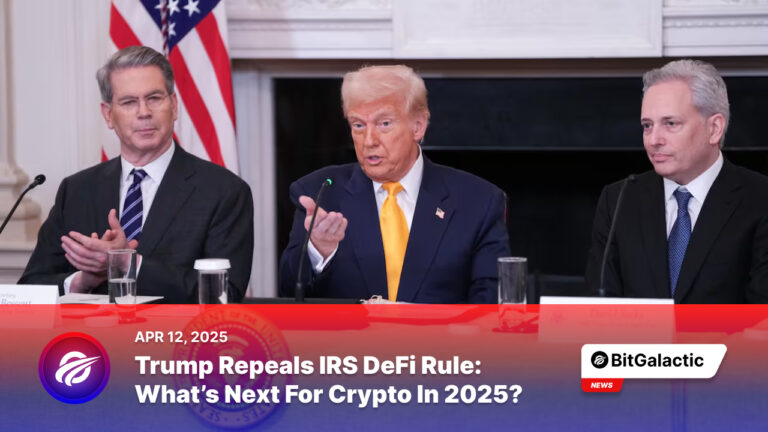Trump Repeals IRS DeFi Rule: What’s Next for Crypto in 2025?
Hey, crypto fam! Imagine waking up to news that could shake the entire DeFi space—boom, it just happened! President Trump just signed a bill that kills an IRS rule targeting your favorite crypto wallets and DeFi platforms. Yeah, I’m talking MetaMask, Uniswap, the works! Stick around because I’m breaking this down with 10 years of crypto experience, dropping some spicy takes, and telling you what this means for YOUR portfolio. Hit that like button if you’re ready to dive into the future of DeFi!
Alright, let’s get to the meat of this. On Thursday, Trump put pen to paper on his first-ever crypto law. This bill? It scraps an IRS rule from the tail end of the Biden era that was gonna treat DeFi websites and wallets like brokers. Picture this: your go-to platforms like MetaMask or Uniswap’s front-end would’ve had to collect a ton of your personal info to stop tax evasion. Sounds like a headache, right? That rule was set to kick in by 2027, but now? It’s toast.
Here’s why this matters. DeFi—decentralized finance—is all about cutting out middlemen like banks. According to DefiLlama, over $114 billion is locked in DeFi protocols as of this week, and most of that flows through user-friendly front-ends. If the IRS rule had gone through, it could’ve choked these platforms with red tape. Developers were freaking out, saying it might’ve killed DeFi innovation in the U.S.
But let’s not pop the champagne just yet. Some folks, like Rep. Richard Neal, warned this repeal could let tax cheats run wild and cost the government $4 billion. Fair point, but here’s my take: the crypto space moves fast, and heavy-handed rules like this often scare away innovation before they catch the bad guys. Balance is key, and right now, this feels like a win for freedom and growth.
Check this out. DeFi’s total value locked has exploded from $1 billion in 2020 to over $114 billion today. That’s not just numbers—that’s people like you and me betting on a decentralized future. Now, let’s talk history for a sec. Remember 2021? The infrastructure bill had crypto folks sweating with vague ‘broker’ definitions that could’ve hit miners and devs. That fight dragged on, and we got a watered-down version. This IRS rule was a sequel to that drama, but Trump’s move just hit the delete button.
What’s wild is how bipartisan this bill was. Most Republicans and a chunk of Democrats backed it. That’s rare in D.C.! It shows crypto isn’t just a niche anymore—it’s mainstream, and lawmakers know it. But here’s where I get skeptical. The IRS isn’t gonna just roll over. They’ll probably cook up something new to keep tabs on crypto gains.
So, what’s next for DeFi? My bet? This repeal is rocket fuel for U.S.-based projects. Platforms like Uniswap could double down on user-friendly upgrades without worrying about IRS snooping. Market-wise, I’m seeing DeFi tokens like AAVE and UNI trending up—check CoinGecko for the latest, but AAVE’s up 15% this month alone. Long term, though, it’s about adoption. If DeFi stays free to innovate, we could see $200 billion in TVL by 2026.
But there’s a flip side. If tax enforcement gets too lax, regulators might clamp down harder later. It’s a tightrope. So, I wanna hear from you—what do you think this means for DeFi? Are we headed for a golden age, or is Uncle Sam gonna crash the party? Drop your thoughts in the comments!
That’s a wrap, crypto fam! If you loved this deep dive, smash that subscribe button and ring the bell—we’re dropping crypto truth bombs every week. BitGalactic’s got your back with the latest news, tips, and alpha to level up your game. Let’s keep building the decentralized future together. Peace out!
Share this post


